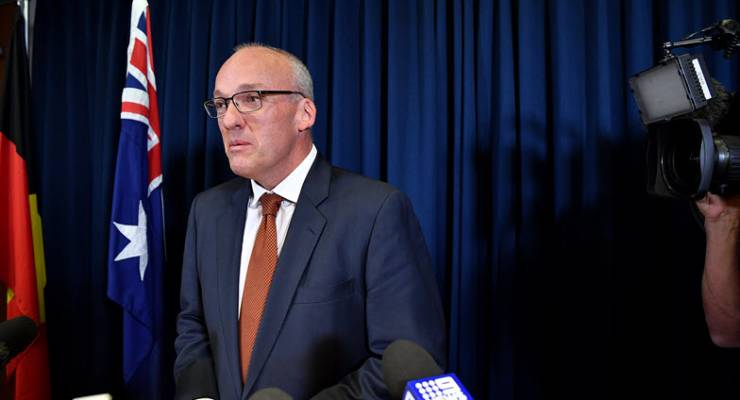
Luke Foley should have resigned as NSW Labor leader the moment the ABC released Ashleigh Raper’s statement on Thursday afternoon. It was immediately apparent from the allegations made by Raper that his leadership was untenable.
Instead, hour after hour went by during the afternoon, with no word from Foley or NSW Labor. It was not until more than three hours later that one of his MPs, Trish Doyle, called for him to resign. Belatedly, Foley announced his exit at 5.30pm, insisting that Raper’s claims were all false and that he would be suing her, but that he couldn’t do that and fight an election at the same time. Foley’s apparent determination to litigate over the issue ensures the matter will now remain in the headlines all the way to the election next March — and beyond.
So, we might ask, what did Foley achieve during his time as leader? He made the right to torture and kill greyhounds his standard and went into battle against Mike Baird’s ban on that vile industry. He exploited the selfishness and NIMBYism of council merger opponents to stymie the eminently sensible program of the Baird government to overhaul NSW’s rotten local government system. And it’s hard to recall a single infrastructure project that Foley supported.
But Foley’s scandal is just another entry in a long list of challenges for NSW Labor. Remember, this is a party that has never properly reformed itself since the rampant corruption of Obeid and Tripodi and Macdonald. The replacement of Foley by Michael Daley (as seems likely) won’t address the basic problem that NSW Labor remains unfit to govern the country’s most populous state.
For Gladys Berejiklian and the NSW Coalition, it’s a double-edged sword. Labor was uncomfortably close in the polls and there was a real chance Foley may have become premier at the election next March. His departure removes that immediate threat, but it’s possible his replacement, with five months to polling day, will offer a different kind of threat to a government that for all its achievements has often been poorly led.
Beyond the banal politics, there is ABC journalist Ashleigh Raper, who insists she wanted to remain silent about the issue because of the harmful impacts for women who speak out about harassment — itself a profound indictment of contemporary media ethics and wider workplace cultures. NSW government minister David Elliott, against the wishes and without the knowledge of Raper, used parliamentary privilege to raise the allegations against Foley several weeks ago. Many have condemned him for using Raper’s experience as political ammunition without her consent. It was a further exploitation of workplace power imbalance, not as bad as the original alleged offence, but exactly the kind of disempowerment women risk: to not merely endure harassment, but to lose whatever agency they have about how they respond to it.
If you or someone you know is impacted by sexual assault, call 1800RESPECT on 1800 737 732 or visit 1800RESPECT.org.au. In an emergency, call 000.








Foley was indeed a dud. Other than this grubby incident, his opposition to Baird’s brave move on Greyhounds was nothing but calculated contrarianism. However the rest of your rant about NSW Labor is just patent nonsense.
Foley’s ultimate response is baffling and probably stupid, but Elliot is every bit as grubby and should be sacked for also abusing Raper indirectly….
Foley possibly (& foolishly) had in the back of his mind that Trump got away with being accused of grabbing a woman’s pussy & ended up president of the USA. Fortunately Australia is still a bit different & I hope he can take Elliot down with him.
I think Barry Elliott is at least as bad as Luke Foley, if not worse. Clearly he decided to throw the female reporter to the wolves for political reasons, and hey presto, it worked. He cannot claim to have to have considered the lady’s feelings or rights at all, and was happy to use her as a weapon against his political enemies.
BErnard, yes Foley is a dud. The rest of this is utter bullshit. The current Liberals are now in my view every bit as corrupt. Look at the completely inexplicable panning decisions, look at the stadiums, look at the Powerhouse. Look how the council amalgamations benefited developers with administrators waving stuff through while the seats were empty. With a decent leader Labor would win.
A government that for all its achievements has often been poorly led… thats being very unkind about Alan and Ray..
And slimy Eric Abetz had a hand as well – you know that friend of Godwin Grech